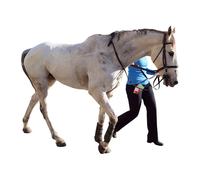The Center for Equine Health, UC Davis School of Veterinary Medicine has been involved in many studies of the geriatric horse. These studies have lead to helpful suggestions for owners of older horses. One of their most thought-provoking papers on the subject of the older horse is The Rule of More and Less.

Special attention for older horses
Small changes in an older horses' responsiveness to food, grooming and exercise can be indicators of oncoming problems.
The Rule of More and Less is as follows:
Older horses need more of our attention focused on their daily activities and appearance. Small changes in their responsiveness to food, grooming and exercise can be indicators of oncoming problems.
Their daily attitude, the general appearance of their hair coat and changes in posture can also signal a potential health problem. Any weight loss or changes in fat distribution should be considered significant until proven otherwise.
The geriatric horse needs more attention to his health care. Regular veterinary exams, vaccinations and parasite control become increasingly important as a horse ages. If he received an annual or twice yearly visit by the veterinarian when he was younger, he may now need quarterly or monthly health exams.
More regular and intensive foot care becomes extremely important in many older patients, especially those with Cushing’s disease-like syndromes. More frequent dental inspections and procedures will inevitably become important for health maintenance.
More attention to dietary needs will also become a necessary component to your older horse’s care, especially in relation to the condition of his teeth. In very old horses, milled and balanced feedstuffs of high nutritional quality inevitably will need to replace hay as the primary source of dietary intake.
On the other hand, your aging horse will become less able to tolerate sudden changes in schedule and activity. A stable and constant routine is best for continued geriatric health, with as few changes as possible in exercise, feeding and travel.
The luxury of saddling up ‘ole Dan once in a blue moon and having him carry you from dawn to dusk with no complaint is now in the past.
As with humans, things that were easy for him to do in his youth become increasingly more difficult with age. A daily exercise regimen with as little variability as possible, combined with a regular grooming and feeding schedule is the old horse’s best friend. The less change you throw at them, the fewer health problems you will likely have.
To summarize, old horses like old people need more attention and less excitement and disruption in their daily routine. They need regular exercise, but no more dance marathons. They need good food, but not too spicy. They need to see their doctors regularly, follow their instructions and take their medicine. Most of all they need someone close by who cares for them, looks out for them and loves them.
Center for Equine Health, UC Davis School of Veterinary Medicine
